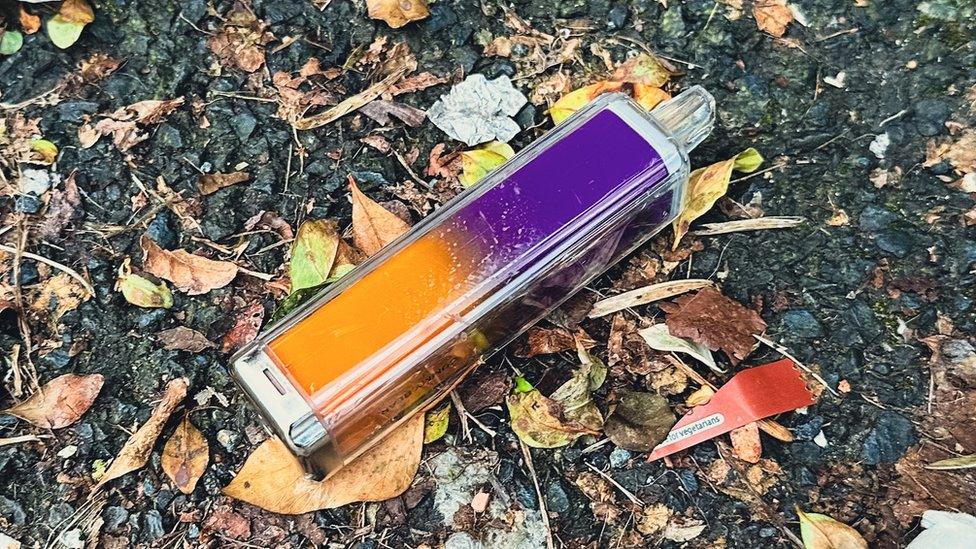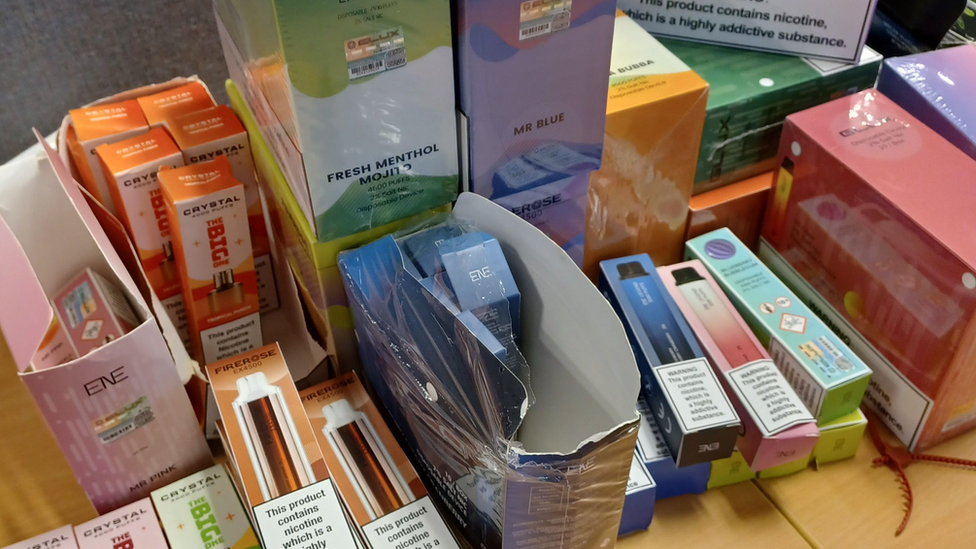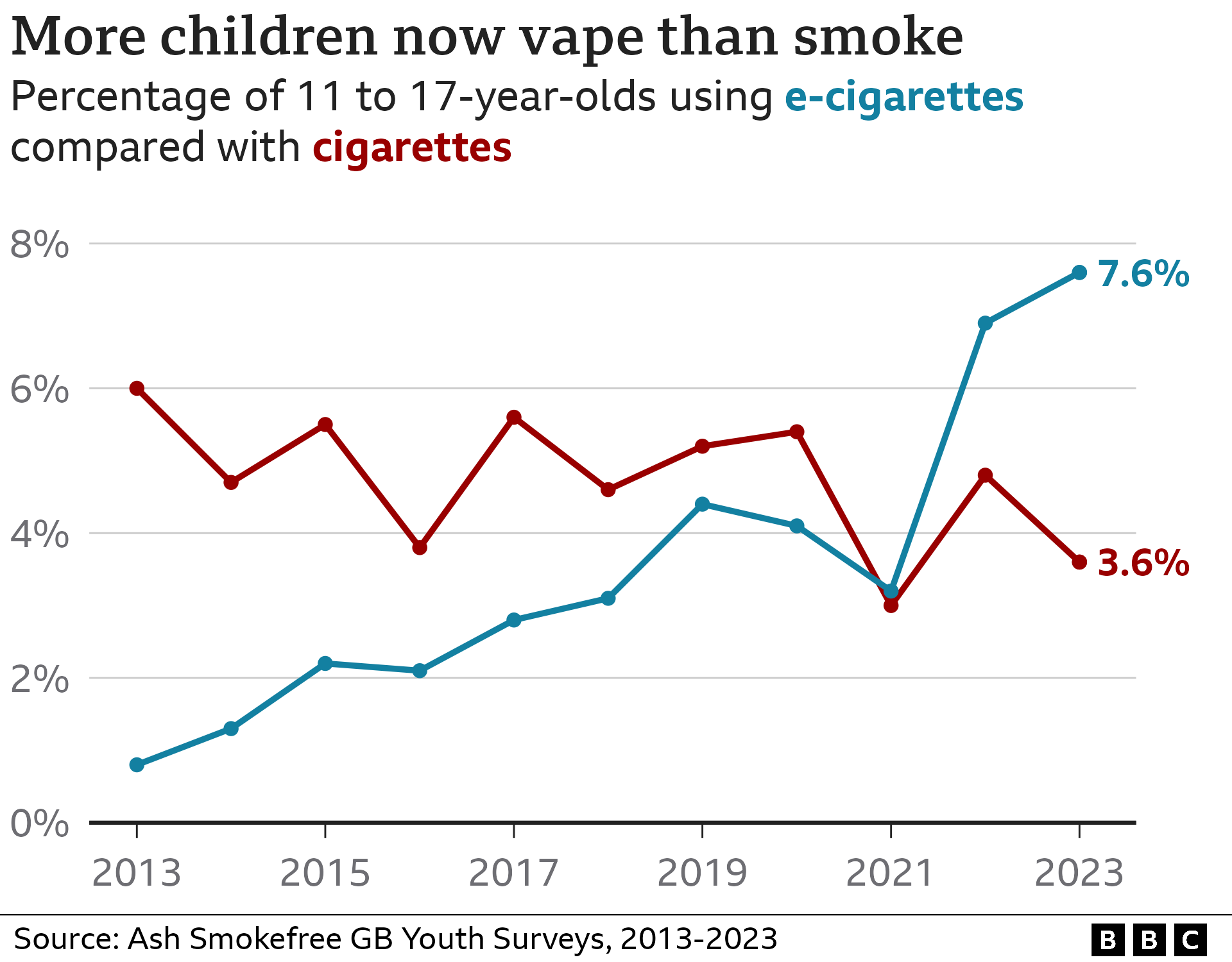Why are disposable vapes so bad for the environment?
Single-use disposable vapes will be banned to protect children’s health and reduce environmental damage.


Disposable vapes will be banned in England and Wales from June 2025, to protect children’s health and reduce environmental damage, the government has said.
Similar restrictions are expected in Scotland and Northern Ireland.
Why are disposable vapes so bad for the environment?
Almost five million single-use vapes were either littered or thrown into general waste each week in 2023, according to the Department for Environment, Food, and Rural Affairs (Defra).
Batteries thrown into household waste cause hundreds of fires in bin lorries and waste-processing centres every year.
As well as lithium-ion batteries, vapes also contain circuit boards which – if not disposed of properly – can leach toxic compounds such as cobalt and copper into the environment as they degrade.
These minerals and the lithium could, if recovered, be reused for green technologies such as electric car batteries or in wind turbines. These industries are already facing a potential shortage of these metals as demand for clean energy grows.
In 2022, vapes containing a total of more than 40 tonnes of lithium were discarded, enough to power 5,000 electric vehicles, the government said.

However, it is not straightforward to recycle vapes because of their size and the way they are manufactured, which makes them difficult to take apart.
According to the Institute of Environmental Management and Assessment, there is currently no large-scale disposable vape recycling in the UK because there are so many different types of vape in the UK market.
This makes it difficult to develop a standard way process the small lithium batteries.
Research published in 2023 suggested only 17% of users recycled their disposable vapes.
How are the rules about vapes changing?
The government said a ban on disposable vapes will take effect in England on 1 June 2025, allowing retailers time to sell their remaining stock.
It will cover single-use vapes which cannot be refilled or recharged.
Wales has already said it will bring in a similar ban on the same date, and the devolved governments in Scotland and Northern Ireland are expected to follow suit.
Setting out its plans in the King’s Speech, in July 2024, Labour said it would:
-
stop vapes being branded and advertised to appeal to children, regulating the flavours, packaging and display of vapes and other nicotine products
-
give Trading Standards more power to prevent under-age sales of tobacco and vapes
-
introduce a progressive smoking ban to gradually end the sale of tobacco products across the country
Health Secretary Wes Streeting has said separate legislation to ban the sale of cigarettes to anyone born after January 2009 will be introduced to Parliament before Christmas.
The previous Conservative government had also announced plans to tackle vaping and smoking.
However, its Tobacco and Vapes Bill had not become law by the time of the July general election, so the Labour government is introducing its own legislation.
Is vaping bad for you?
Using e-cigarettes or vapes is nowhere near as harmful as smoking cigarettes.
However, health experts agree anyone who does not smoke should not start vaping.
Doctors say vaping may cause long-term damage to young people’s lungs, hearts and brains.
The vapour inhaled contains a small amount of chemicals, often including the addictive substance nicotine.
More research is needed to fully understand the health effects of e-cigarettes.
But in December 2023, the World Health Organization (WHO) said: “Alarming evidence on their adverse population health effects is mounting.”
Illegal vapes are widely available and are much more likely to contain other harmful chemicals or drugs.

Why is vaping better than smoking?
Cigarettes contain tobacco, tar and a host of cancer-causing toxic chemicals and are the largest preventable cause of illness and death in the UK.
About half of all lifelong smokers will die early, losing on average about 10 years of life.
That is why people who smoke are urged to stop, with nicotine vapes the most effective quit tool – better than nicotine patches or gum.
Research suggests people having face-to-face support while using vapes can be up to twice as likely to stop smoking than those using other methods.
But vaping is not harmless, so it is only recommended for adult smokers, who are offered free vape kits on the NHS to help them quit as part of its “swap to stop” programme.
The NHS says thousands of people have given up smoking using vaping as an alternative.
How many adults use vapes?
About 5.1 million people in the country used a vape or e-cigarette in 2023, according to the Office for National Statistics.
The highest rate, nearly 16%, was among 16-24-year-olds.
Just under 6% of people aged 16 or over vaped every day, while another 4% did so occasionally.
The number of people in England who vape despite never having been regular smokers has increased significantly, according to research published in The Lancet.
It found e-cigarette use among this group has increased from one in 200 people in 2021, to one in 28 – just over a million people.
Fewer people in the UK are smoking than ever before – about 12% of the population, or six million, in 2023. In 2011, 20% of people smoked.
How many children vape?
It is illegal to sell vapes containing nicotine to under-18s, or for adults to buy them on their behalf.
But vape use among younger teenagers has grown.
Nearly 8% of 11-17-year-olds vaped in April 2023, according to an online survey of 2,000 children by health charity ASH (Action on Smoking and Health). That was up from 4% in 2020.
Vaping is now twice as common as smoking among children.

What are the vaping rules in other countries?
The US has prohibited some vape flavours like mint and fruit in particular e-cigarettes.
However, the US Food and Drug Administration (FDA) has reversed the 2022 ban on products sold by Juul, one of the country’s biggest e-cigarette companies. It said a full review of Juul’s products was pending.
The company previously settled more than 5,000 US vaping legal actions, after being accused of targeting teenagers.
In Australia e-cigarettes containing nicotine are generally available on prescription only, for smokers who want to give up tobacco. And pharmacies do not sell disposable vapes.
New Zealand brought in new rules in 2023, banning most disposable vapes and targeting flavours which appeal to children.
Countries including South Korea, India and Brazil have also brought in very strict vape rules, while China has announced restrictions.
However, 88 countries have no minimum age for buying vapes, and 74 have no laws in place for e-cigarettes, according to the World Health Organization (WHO).







